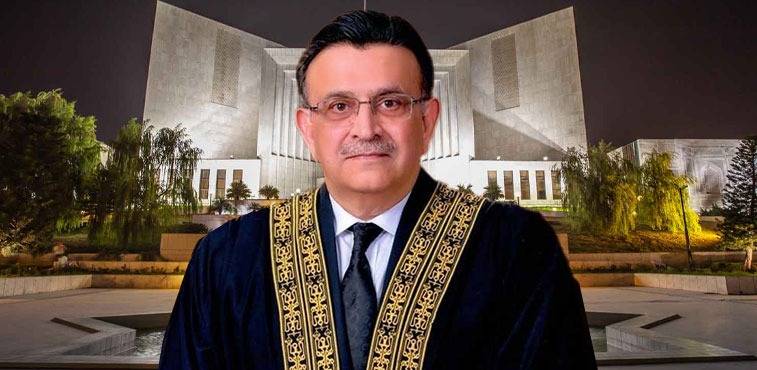
A three-member bench of the Supreme Court led by Chief Justice Umar Ata Bandial on Friday turned down AGP Mansoor Awan's request to form a full court to hear PTI's plea against the Punjab elections delay.
According to the court, the law or the rules don't support the composition of a full court and doing so would take the matter back to its start.
During the hearing, CJP Bandial insisted that the relationship between the judges was "good", and said that Monday would bring in good news.
The judge also disregarded the order issued by Justice Qazi Faez Isa and Justice Aminuddin Khan on his suo motu powers and said it violates the rules laid down by a five-member larger bench.
The hearing into the case was subsequently adjourned for April 3.
Earlier today, the newly-reconstructed four-member bench formulated to hear the plea against the ECP decision to postpone polls was dissolved again after Justice Jamal Khan Mandokhail recused himself from the case.
Following the dissolution, the SC announced that the bench comprising Chief Justice Umar Ata Bandial, Justice Ijaz Ul Ahsan, and Justice Muneeb Akhtar, would continue hearing the case.
On Thursday, Justice Aminuddin Khan recused himself from a five-member bench hearing the case related to the delay in elections.
Following the ECP‘s decision to push the Punjab elections from April 30 to October 8 due to the financial and security agencies’ acknowledged inability to support the electoral process, the PTI filed a petition with the Supreme Court.
On Wednesday, a three-member bench of the Supreme Court ruled that hearing of all cases under Article 184(3), which is related to the CJP’s suo motu powers, be postponed till amendments in the SC rules.
“The interest of citizens therefore will be best served to postpone the hearing of this case, and of all other cases under article 184(3) of the Constitution, till the matters noted hereinabove are first attended to by making requisite rules in terms of article 191 of the Constitution,” the order read.
According to the court, the law or the rules don't support the composition of a full court and doing so would take the matter back to its start.
During the hearing, CJP Bandial insisted that the relationship between the judges was "good", and said that Monday would bring in good news.
The judge also disregarded the order issued by Justice Qazi Faez Isa and Justice Aminuddin Khan on his suo motu powers and said it violates the rules laid down by a five-member larger bench.
The hearing into the case was subsequently adjourned for April 3.
Earlier today, the newly-reconstructed four-member bench formulated to hear the plea against the ECP decision to postpone polls was dissolved again after Justice Jamal Khan Mandokhail recused himself from the case.
Following the dissolution, the SC announced that the bench comprising Chief Justice Umar Ata Bandial, Justice Ijaz Ul Ahsan, and Justice Muneeb Akhtar, would continue hearing the case.
On Thursday, Justice Aminuddin Khan recused himself from a five-member bench hearing the case related to the delay in elections.
Following the ECP‘s decision to push the Punjab elections from April 30 to October 8 due to the financial and security agencies’ acknowledged inability to support the electoral process, the PTI filed a petition with the Supreme Court.
On Wednesday, a three-member bench of the Supreme Court ruled that hearing of all cases under Article 184(3), which is related to the CJP’s suo motu powers, be postponed till amendments in the SC rules.
“The interest of citizens therefore will be best served to postpone the hearing of this case, and of all other cases under article 184(3) of the Constitution, till the matters noted hereinabove are first attended to by making requisite rules in terms of article 191 of the Constitution,” the order read.

